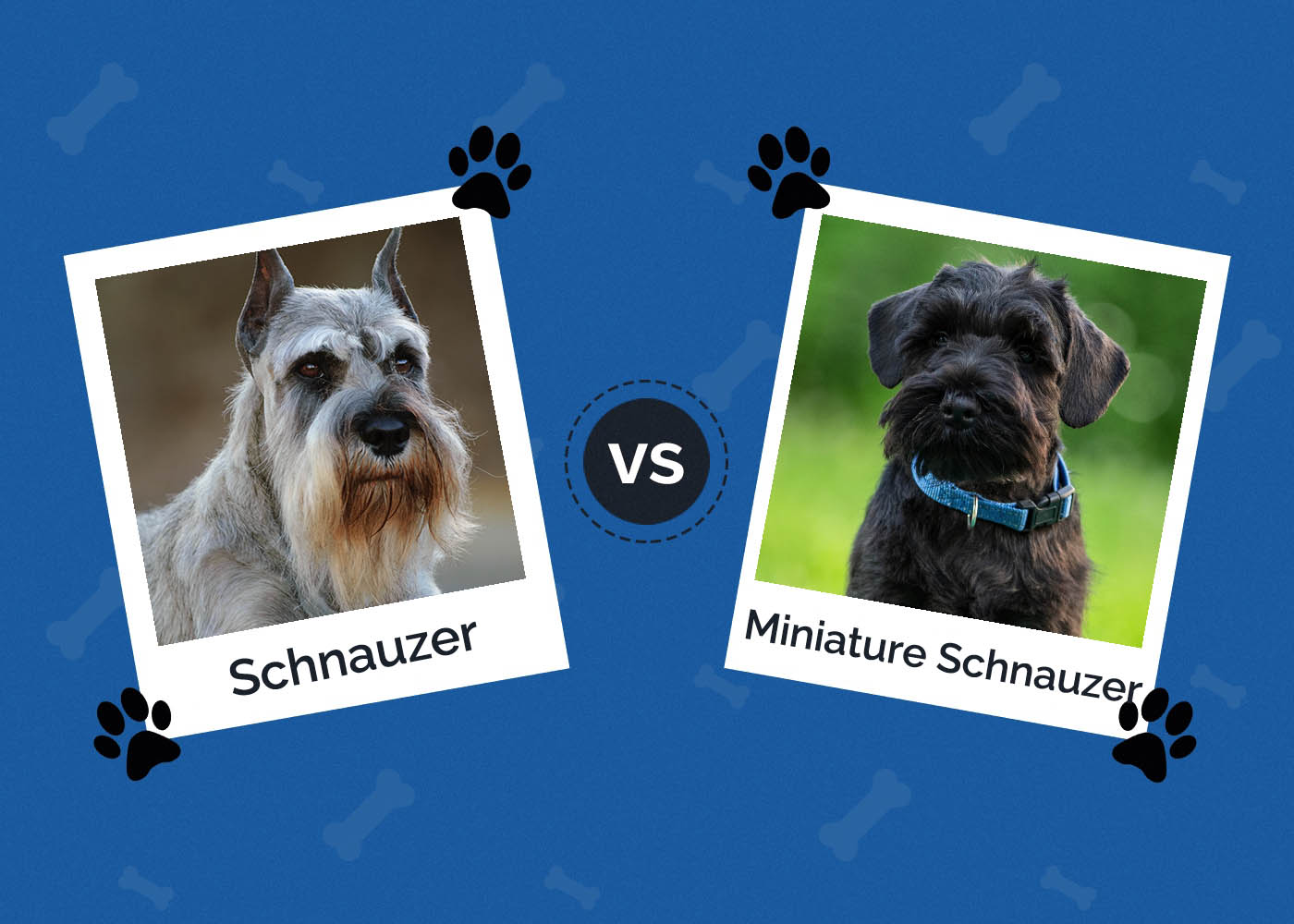13 Fruits Dogs Can Eat Safely: Vet-Approved Types (With Pictures)
Updated on
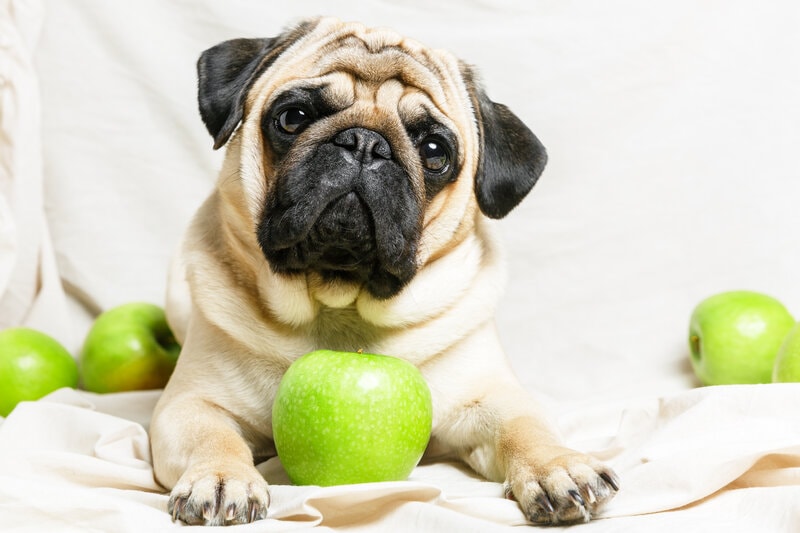
Fruits make a tasty, sweet treat for us to eat, and many fruits are extremely affordable. If you live near a grocery store, they’re also usually widely available. Whether you’re growing your own fruit or shopping at the supermarket, you need to know what fruits are and aren’t safe for dogs if you’re planning to share your fruits with your pup. While many fruits are suitable for dogs to eat regularly or as an occasional treat, some common fruits can be toxic, or even deadly, to dogs, like grapes.
The 13 Vet-Approved Fruits Dogs Can Eat Safely
1. Apples
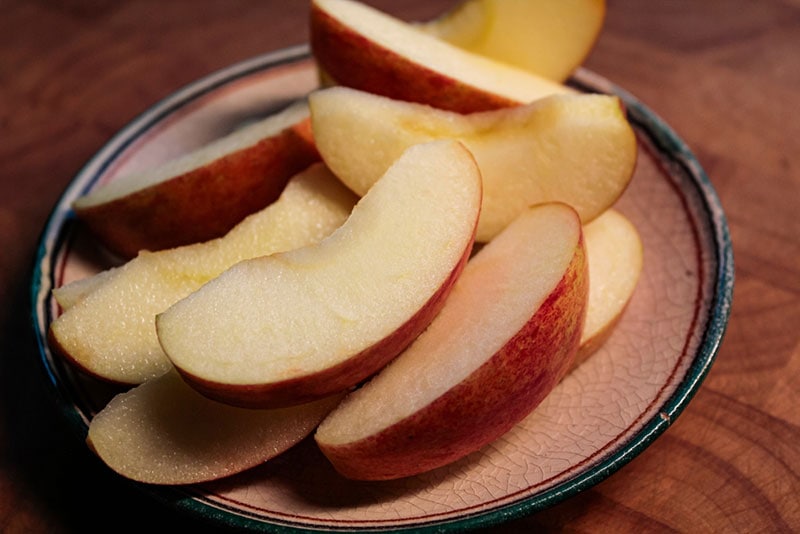
Probably the most common fruit, apples come in tons of varieties, including different colors, flavors, and sizes. All apples are safe for dogs, and many dogs like apples because of their slightly sweet flavor. They’re a good source of fiber, as well as vitamins A and C.
Apples should be cored and cut into bite-sized pieces before being fed to your dog, though. Whole apples pose a choking hazard, and apple seeds contain cyanide. Although the amount of cyanide is extremely minimal, it’s recommended to avoid letting your dog eat the seeds.
2. Bananas
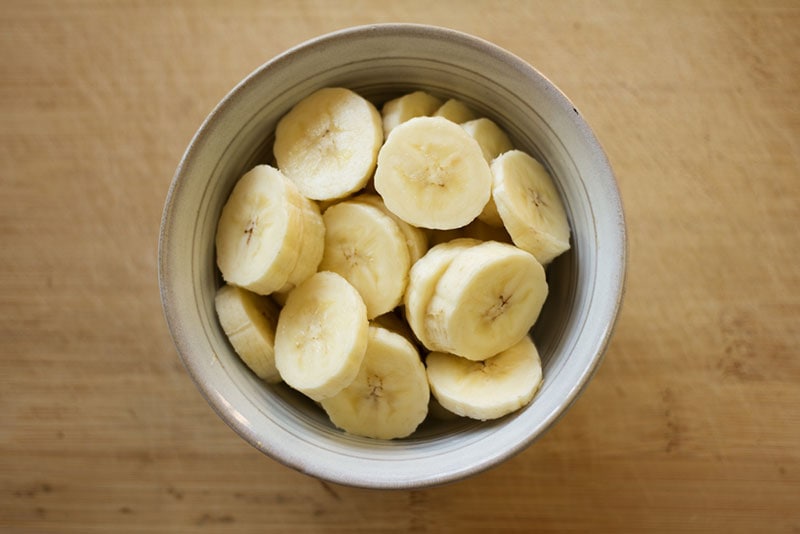
Bananas are a widely available and extremely affordable fruit, not to mention they taste delicious. Many dogs like bananas, although pickier dogs may turn their noses up at them. Bananas are an excellent source of fiber and potassium, but they are slightly high in sugar, so it’s advised to only offer small pieces of banana as an occasional treat.
The soft texture of bananas makes them a low choking hazard, although there is still a risk with dogs that eat quickly or tend to swallow food whole, so make sure to break it into pieces and peel it before offering it to your dog.
3. Bell Pepper
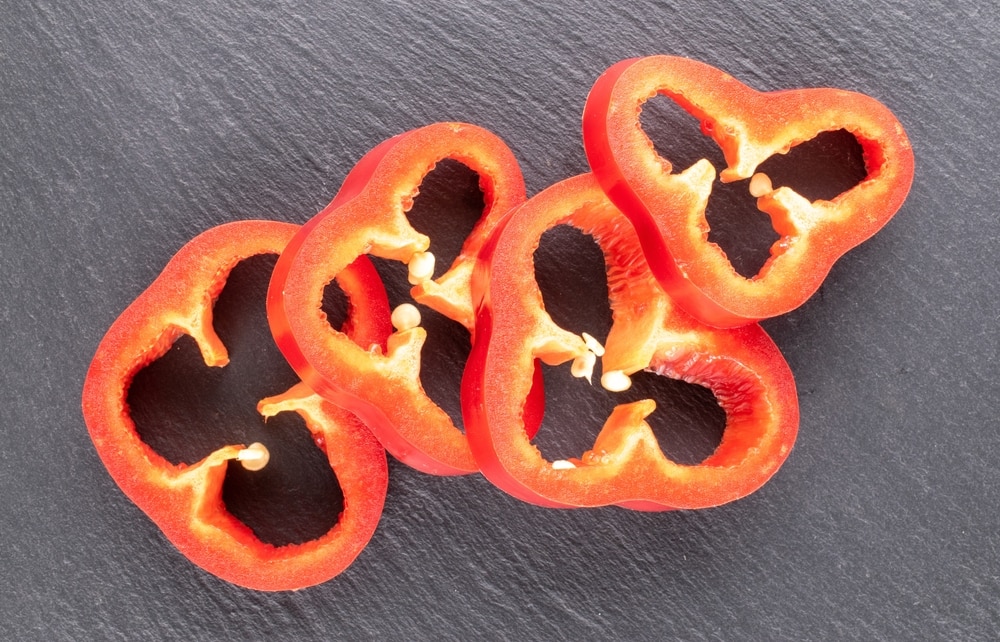
Although bell peppers are often considered a vegetable, they are actually a fruit. Not only are they a fruit, but they’re a dog-friendly fruit! Bell peppers are low in calories and high in fiber and vitamins A and C. They can make a crunchy treat for dogs that need to lose weight. Different colors of bell peppers provide different amounts of nutrients, with red bell peppers typically being the most nutrient-dense option. Avoid feeding your dog any spicy peppers that contain capsaicin, though, including jalapenos, habaneros, poblanos, and shishitos.
4. Berries

There are multiple types of berries that are healthy and safe for dogs, including blueberries, strawberries, raspberries, and blackberries. Berries are extremely nutrient-dense, as well as low in calories and high in antioxidants. Because of their small size, most berries can be fed to your dog whole since they’re naturally in bite-sized pieces.
There are berries that are unsafe for dogs, though, including gooseberries, pokeberries, juniper berries, dogwood berries, holly berries, and baneberries, so make sure to stick to the more “mainstream” berries that are available at your local grocery store.
5. Cantaloupe, Honeydew, and Watermelon
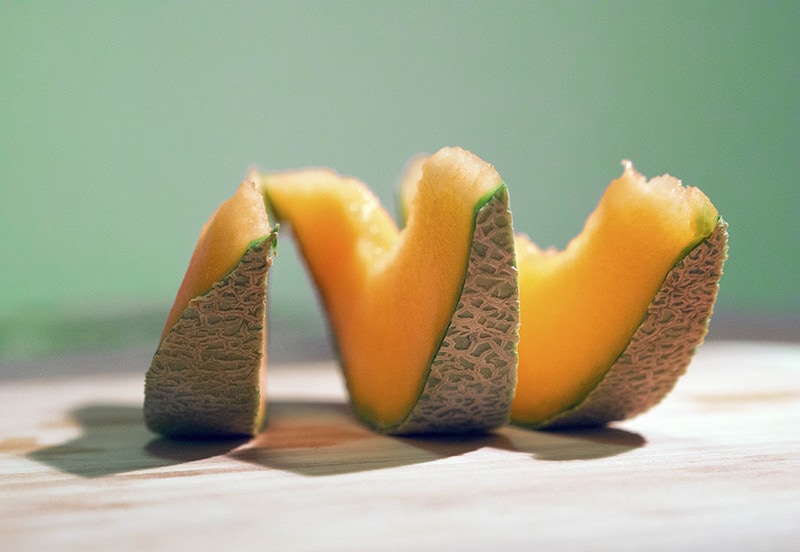
ImagesBG, Pixabay
Melons come in a variety of shapes and flavors, and all common melons are safe for dogs, including cantaloupe, honeydew melon, and watermelon. They do tend to be high in sugar, though, so melons should be fed sparingly.
Also, never give your dog a melon rind. They are hard and fibrous, so they pose a choking hazard, not to mention providing little nutritional value. Melon balls or cubes make a nice treat for your pup on a hot day!
6. Cranberries
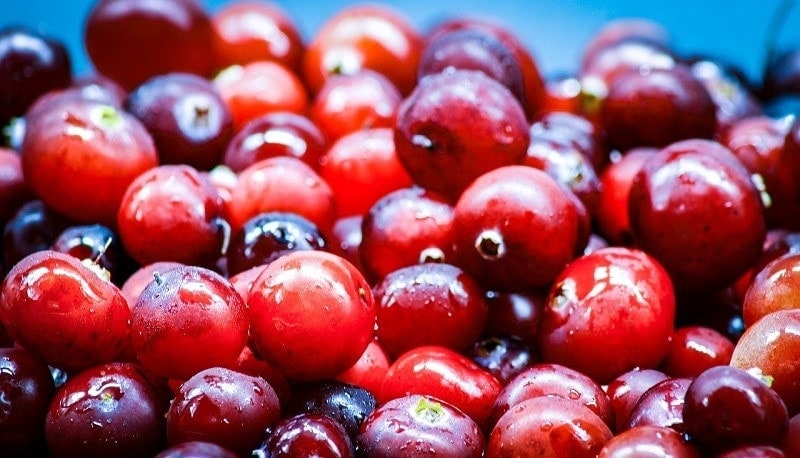
Fresh, whole cranberries are safe for dogs to eat, and they don’t need to be cut before serving. They’re high in multiple nutrients, including fiber, antioxidants, manganese, copper, and vitamins C, K, E, B1, and B2. Fresh cranberries are often a seasonal find, though, with dehydrated cranberries usually being the more common form they are sold in.
Don’t give your dog dehydrated cranberries, cranberry sauce, or other processed cranberry products, since these often contain very high amounts of added sugar. Many dogs don’t care for cranberries, so you may have to experiment with this one.
7. Cucumber

Like bell peppers, we don’t often think of cucumbers as a fruit, but they actually are. Cucumbers are an excellent treat for dogs because they are low in calories and provide a lot of water to help maintain hydration. Because of their fiber content and density, cucumbers may help your dog feel fuller for a short period, without all the added calories of other types of treats.
Cucumbers should be cut into slices or cubes before being fed to your dog. They can eat the skin, but make sure to wash it thoroughly.
8. Mangos
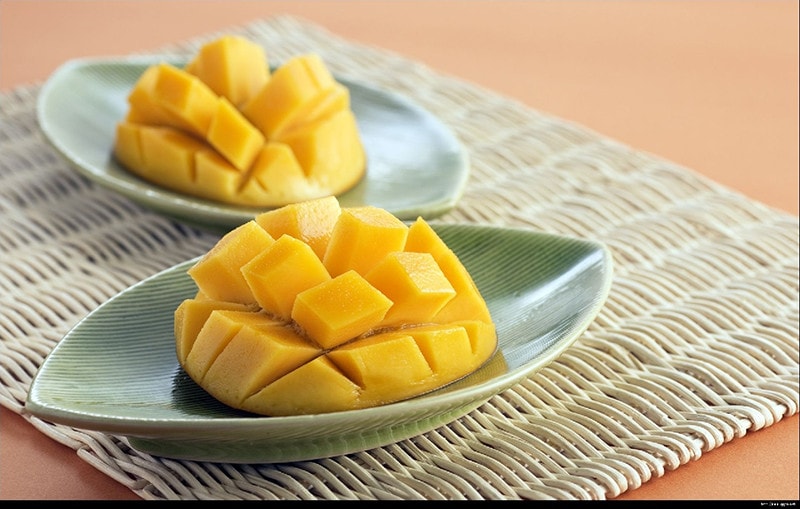
Mangos are a very tasty tropical fruit, and they can be difficult to find in some areas. Many dogs like mangos, though. They are very sweet, which makes them popular, but they should be fed sparingly due to their sugar content. Dogs should only be fed the “meat” of a mango. They should never be offered the skin or the pit, as these pose a choking hazard.
9. Oranges

Oranges are usually available year-round, and they are often quite affordable. They are safe for dogs, and, as we all know, oranges are an excellent source of vitamin C. It’s not uncommon for dogs to turn their noses up at citrus fruits, so oranges may not be a hit, but you can try it! They may be more likely to enjoy sweeter and less tart orange varieties, like mandarin oranges.
Don’t feed your dog canned oranges, and make sure to remove the skin and serve oranges to your dog in bite-sized slices or pieces.
10. Peaches and Nectarines

These tasty summer stone fruits are highly sought after when they’re in season, and they’re both fruits that your dog will likely enjoy sharing with you. Dogs can eat the skin, although these fruits should be thoroughly washed before eating.
Always remove the pit before feeding these to your dog, and cut them into pieces, much like you would an apple or orange. Don’t offer your dog canned peaches, as these are usually far too high in sugar. While peaches and nectarines are safe for dogs, other fruits that share the same genus, including prunes and cherries, are not safe for dogs.
11. Pears
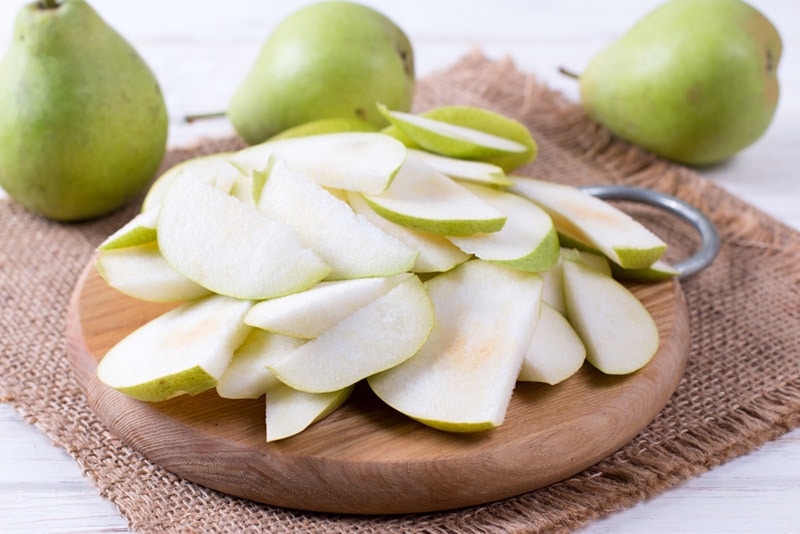
Pears are another seasonal fruit that may be difficult to come across year-round, but when you can find them, they can be quite tasty. They’re an excellent source of fiber, as well as vitamins C and K. They’re an extremely nutrient-dense, healthy fruit for humans and dogs alike.
Like apples, they should be cut into bite-sized pieces before being fed to your dog. Pears have a much less pronounced core than apples, but make sure to remove the seeds and any hard bits of the core before giving them to your dog.
12. Pineapple
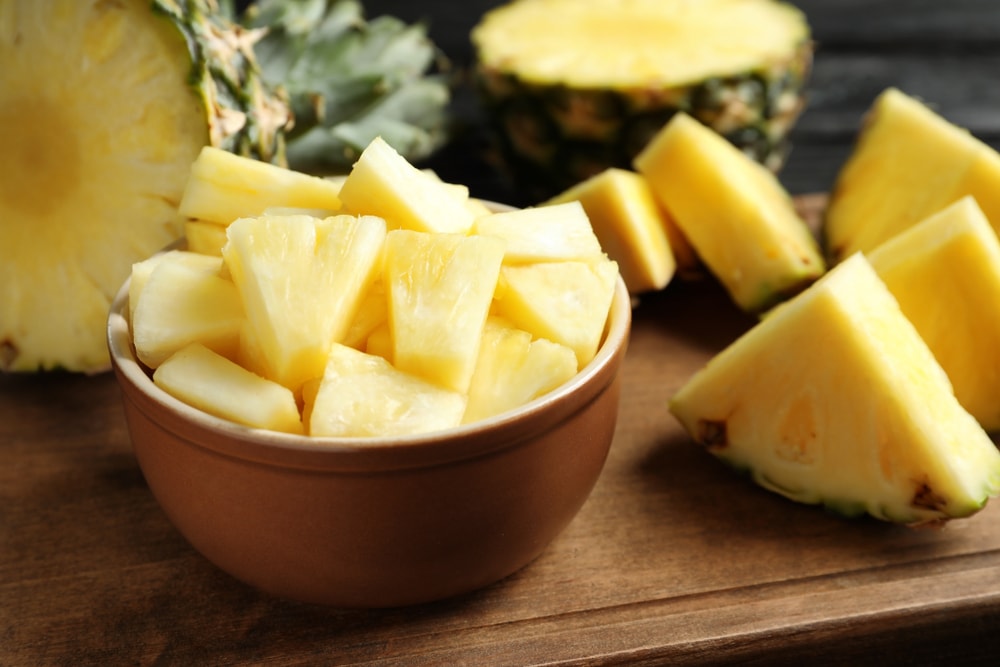
Pineapple is a very tasty, sweet fruit, and it’s high in fiber, along with multiple vitamins and minerals. Pineapples are very high in sugar, so they should only be offered sparingly to dogs, as they can cause stomach upset in larger amounts. Only offer your dog bite-sized pieces of pineapple that have had the core and hard outer skin removed. Don’t feed your dog canned pineapple, since it has lots of added sugar.
13. Pumpkin
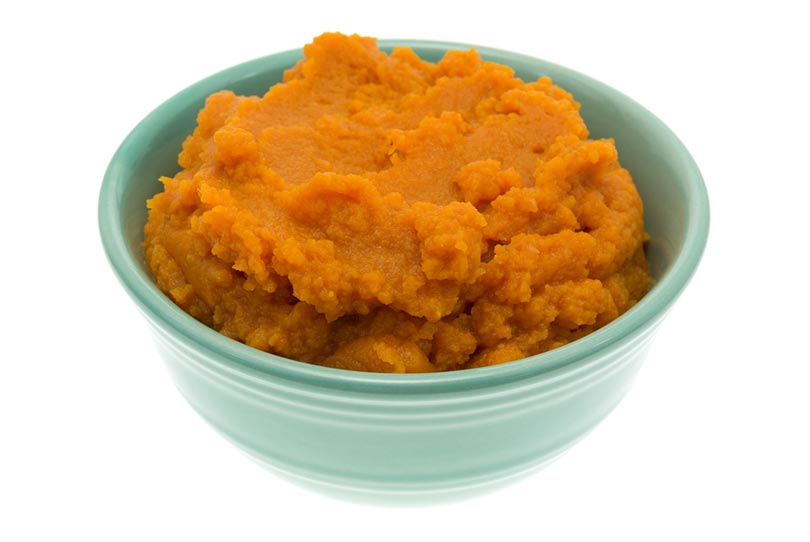
Pumpkins may be considered a fall vegetable, but they’re actually a type of winter squash and are fruits. Pumpkin can be extremely healthy for dogs, thanks to its high fiber content and low calories and sugar.
Pureed or chopped pumpkin is often offered to dogs with digestive upset to help soothe their digestive tract and support healthy bowel movements. Canned pumpkin can be fed to dogs, but it should always be plain canned pumpkin, not pumpkin pie filling. Even though pumpkin can help if your dog has an upset stomach, it’s best to talk to your vet about your dog’s symptoms to rule out a serious problem.
What Fruits Are Unsafe for Dogs?
- Avocados
- Cherries
- Grapes
- Lemons and limes
- Prunes
- Tomatoes
Conclusion
Many of the fruits that people eat are safe and healthy for dogs, but like with all things, fruits should be offered in moderation. They are not a necessary part of your dog’s daily diet if your dog eats a high-quality commercial kibble, but they can be a sweet treat for your dog. Start off slowly when giving fruit to your dog, especially with those high in sugar or fiber. Suddenly offering your dog large amounts of some fruits can lead to stomach upset.
See also:
- Can Dogs Eat Apples? Vet Approved Nutrition Facts & FAQ
- Can Dogs Eat Green Apples? Vet Reviewed Nutrition Facts & FAQ
Featured Image Credit: Katya Naumova, Shutterstock






